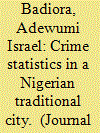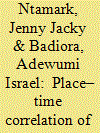|
|
|
Sort Order |
|
|
|
Items / Page
|
|
|
|
|
|
|
| Srl | Item |
| 1 |
ID:
148244


|
|
|
|
|
| Summary/Abstract |
The study identified predominant crime type and pattern of crime occurrence in Ile-Ife, Nigeria. The research used crime data, by type and location, from January 2005 to December 2010. The spatial distribution of crime types revealed that 68 cases (49%) of offences against individuals occurred in the core area of the city, 40 (29%) in the transition area and 31 (22%) in the suburban, while 184 (20%), 265 (30%) and 451 cases (50%) of offences against property occurred in the core, transition and suburban respectively. The study concluded that there was notable geographical variation in the pattern of crime locations and that this differs with regard to crime type.
|
|
|
|
|
|
|
|
|
|
|
|
|
|
|
|
| 2 |
ID:
151749


|
|
|
|
|
| Summary/Abstract |
This article investigates the correlation of space and time in the clustering of robbery incidents in metropolitan Lagos. Analysis was carried out on 781 selected robbery incidents in 2013. Using the Mantel index to correlate place and time intervals for pairs of robbery incidents, the results show that robberies are respectively concentrated in residential areas, transport nodes and public places, peaking at midnight during weekdays. The results further show that this concentration is most likely greater than what would be expected on the basis of a chance distribution. The study concludes that various factors may exist which cause clusters of robberies to occur in these places at these times.
|
|
|
|
|
|
|
|
|
|
|
|
|
|
|
|
| 3 |
ID:
182473


|
|
|
|
|
| Summary/Abstract |
Against the background of the solution-defying incidence of child labourers in Nigerian cities, this study examined the relationship between public spaces and incidence of child labourers in Ibadan Municipality, Nigeria. Data were obtained through direct counting of child labourers and cursory observation of the physical and environmental compositions of their places of operation. The direct counting was conducted for seven days of the week in the morning, afternoon and evening within defined activity-nuclei purposively selected across three densities of residential areas of the municipality: high, medium and low. The data collected were subjected to descriptive statistics. Findings showed that the incidence and categories of child labourers varied with public spaces and density of residential areas, and also followed the concentric, sector and multiple nuclei theories of urban land use. The study, therefore, recommended that urban planners and government have roles to play in offering lasting solution to the menace of child labour.
|
|
|
|
|
|
|
|
|
|
|
|
|
|
|
|
| 4 |
ID:
137200


|
|
|
|
|
| Summary/Abstract |
Using crime review figures for four randomly selected states in Nigeria, this study examines cases of kidnapping and its implications for the national economy. The findings reveal that kidnapping is consistently on the increase in Nigeria and is not evenly spread across regions. It is shown that 15 cases were recorded in 2005 and 43 cases in 2008. In 2009, 138 cases were officially recorded, of which 22% and 76% occurred in Rivers and Edo states respectively. Findings further showed that modern kidnapping in Nigeria is triggered by resource control disputes directed both at oil expatriate workers and at prominent citizens, politicians and members of their families. The crisis, which came to the fore in 2005, has forced oil production shutdowns of up to 800 000 barrels per day. The study concludes that kidnapping is becoming a serious crime in Nigeria with significant negative implications for foreign investment, national foreign exchange earnings, and revenue generation.
|
|
|
|
|
|
|
|
|
|
|
|
|
|
|
|
|
|
|
|
|